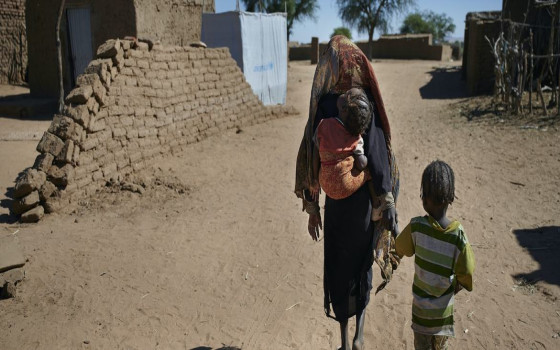
Sudan: 500 Days of Siege - El Fasher Children Face Hunger, Displacement, and Deadly Violence

- Europe and Arabs
- Thursday , 28 August 2025 5:15 AM GMT
Khartoum - New York: Europe and the Arabs
After 500 days of siege, the city of El Fasher in North Darfur, Sudan, has become a hotbed of children's suffering, with malnutrition, disease, and violence killing children daily, UNICEF warned. UNICEF reported in a press release that at least 600,000 people—half of them children—have been displaced from El Fasher and surrounding camps in recent months. An estimated 260,000 civilians, including 130,000 children, remain trapped in dire conditions and have been cut off from aid for more than 16 months, according to the UN Daily News.
"We are witnessing a devastating tragedy—the children of El Fasher are starving while UNICEF's life-saving nutrition services are being denied," said Catherine Russell, UNICEF Executive Director.
She warned that obstructing humanitarian access is a grave violation of children's rights. She continued, "Children's lives are at stake. UNICEF continues to call for immediate and full access, including through extended pauses in fighting to allow us to reach all children in need. Children must be protected at all times and must receive life-saving assistance."
Catastrophic Toll on Children
UNICEF warned that the toll on children is catastrophic. Since the siege began in April 2024, more than 1,100 grave violations have been verified in El Fasher alone, including the killing and maiming of more than 1,000 children. Many were killed in their homes, inside displacement camps, or in markets.
At least 23 children were raped, gang-raped, or sexually assaulted, while others were abducted, recruited, or used by armed groups. Given limited access and difficulties in verification, the number of affected children is almost certainly much higher. Another mass casualty incident was reported this week, with seven children killed in an attack on the Abu Shouk IDP camp, located on the outskirts of El Fasher.
Health Facilities Suspend Services
In El Fasher, a siege imposed by the Rapid Support Forces has completely cut off supply lines. Health facilities and mobile nutrition teams have been forced to suspend services due to depleted supplies and an inability to bring in new ones, leaving an estimated 6,000 children suffering from severe acute malnutrition without treatment. Without therapeutic food and medical care, these children are at high risk of death.
Health and education facilities have come under sustained attack, with 35 hospitals and six schools bombed, including the El Fasher Saudi Maternity Teaching Hospital, which was bombed more than ten times, killing and wounding many, including children. In January, shelling destroyed the health treatment center in Abu Shouk camp, depriving thousands of malnourished children of treatment.
At the same time, acute malnutrition is spreading rapidly. More than 10,000 children in El Fasher have been treated for severe acute malnutrition since January—nearly double the number recorded last year. But depleted supplies have now forced the suspension of services. Recent reports indicate that at least 63 people—mostly women and children—died from malnutrition in a single week.
The situation in the wider region is also alarming. In July, Mellit locality—which hosts many displaced people from El Fasher—recorded a 34.2% acute malnutrition rate, a record high since the start of the war in Sudan.
Worst cholera outbreak in decades
UNICEF explained that the blockade coincides with the worst cholera outbreak in Sudan in decades. Since July 2024, more than 96,000 suspected cases and 2,400 deaths have been reported, with nearly 5,000 cases and 98 deaths in Darfur alone. In the densely populated camps around Tawila, Zamzam, and El Fasher, children weakened by hunger are highly vulnerable to deadly waterborne diseases.
UNICEF said it continues to call on the Government of Sudan and all other stakeholders to help ensure sustained, unhindered, and safe access to children wherever they are in Sudan, including:
An immediate and sustained humanitarian pause in El Fasher and across other conflict-affected areas.
Unhindered humanitarian access for the delivery of therapeutic food, medicines, clean water, and other essentials.
Re-establishment and continuity of UN and partner operations in the most affected areas.
Protection of civilians, including children, and civilian infrastructure in accordance with international humanitarian law.












No Comments Found